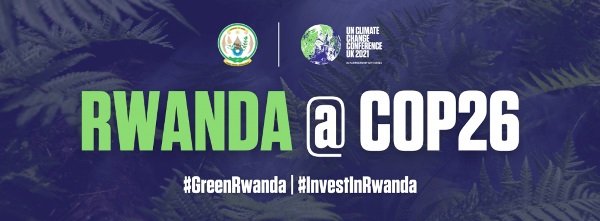
From 1-12 November 2021, Rwanda will join the rest of the international community at the 26th UN Climate Change Conference in Glasgow, Scotland and call for ambitious action to address the climate crisis. The event will bring together thousands of delegates from governments, the private sector and civil society to renew commitments to limit the warming of the planet.
This year’s conference, known as COP26, will be an opportunity for Rwanda to engage with bilateral and multilateral partners, as well as investors in the country’s climate action and green growth agenda. During the global event, Rwanda will share its track record of fostering innovative solutions to climate change. and why the country is one of the best destinations for green investment.
Rwanda’s delegation to COP26 will be led by the Prime Minister, Édouard Ngirente, and include senior leaders from across government, civil society and the private sector. This year, Rwanda’s Minister of Environment, Dr Jeanne d’Arc Mujawamariya, is co-chairing negotiations on achieving common timeframes for all nations when they submit plans for and report on emissions reductions.
Rwanda is committed to protecting the environment and addressing climate change, and has a vision to be a climate resilient and carbon neutral economy by 2050. The country is working to achieve its 2030 goal of reducing emissions by 38% by engaging with partners, both nationally and internationally, to attract sustainable green investment. COP26 will be a strategic forum to advance these efforts, engage partners and seek new investors to support the country’s climate action plan and green growth goals.
‘‘We can overcome immense challenges when we unite with a common purpose. That’s why Rwanda is hopeful that COP26 will reach consensus on the critical issues including the implementation framework of the Paris Agreement, guidelines on carbon markets and the finance needed to address climate change and adapt to it,’’ said Minister Dr Jeanne d’Arc Mujawamariya.
Pending decisions to be made by countries at COP26 include setting common timeframes for national climate commitments, strengthening transparency around reporting emissions reductions and climate finance, as well as determining how the global carbon market will work.
Rwanda’s Climate Action Journey
The Government of Rwanda has put environment and climate change at the center of the country’s policies and plans. Under the country’s Vision 2050, Rwanda has a bold vision to become a carbon-neutral and climate resilient economy by the middle of the century.
In May 2020, Rwanda was the first African country to submit its revised climate action plan (NDC). In the plan, Rwanda has an ambitious target to reduce greenhouse gas emissions by 38% by 2030 compared to business as usual, equivalent to an estimated mitigation of up to 4.6 million tonnes of carbon dioxide equivalent (tCO2e).
The country’s efforts to limit its contribution to climate change and adapt to the consequences of a warming planet over the next decade is estimated at US $11 billion, made up of 5.7 billion dollars for mitigation and 5.3 billion dollars for adaptation.
To ensure the country remains well coordinated in financing these goals, the Rwanda Green Fund (FONERWA) was created. Since its inception, the Fund has raised US $217 million for green investments across the country.
Rwanda was one of the few first countries to ban plastic bags in 2008 and single use plastics in 2019. Rwanda’s efforts to manage existing forests and reforest areas of the country have led to 30.4% of the country being covered with forests. These areas play an important role in mitigating Rwanda’s contribution to climate change.
A National Cooling Strategy has been put in place which will phase out or reduce the use of powerful greenhouse gases used in cooling systems (known as HFCs) as part of efforts to achieve the goals of the Kigali Amendment to the Montreal Protocol.
Rwanda is also investing heavily in e-mobility, sustainable urbanisation, climate smart agriculture and renewable energy.
‘‘To achieve global climate goals, countries need to manage the increasing impacts of climate change on citizens’ lives and renew their commitment to sustainable climate finance. COP26 is an opportunity for the world to end the fossil fuel era and start regenerating nature, while also protecting remaining ecosystems,” said Minister Dr. Mujawamariya.(End)
